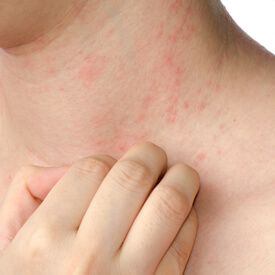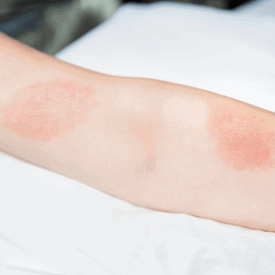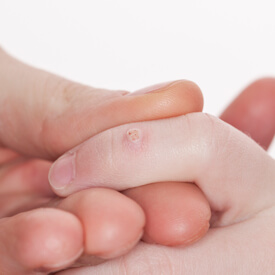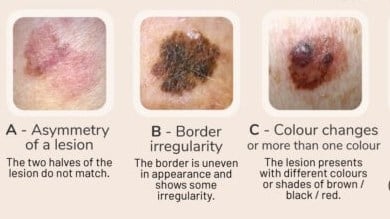Texture improvement, collagen production, minimized wrinkles, and anti-inflammatory properties are benefits of using retinoids!
Psoriasis in Fort Washington, PA
ABOUT PSORIASIS
Dr. Aradhna Saxena, medical director of the Dermatology and Skin Cancer Institute, assists men and women with the treatment and ongoing management of psoriasis. This is a chronic skin condition that occurs when skin cells grow too rapidly. Psoriasis causes flaky, red, silvery patches of skin that can become inflamed, itchy, scaly, and crusty. Normal skin cells turn over and flake about once a month, or every four weeks. Sufferers of psoriasis have skin cells that build up quickly and form what are known as plaques. They can range in size and location on the body, forming on the elbows, hands, knees, scalp, and lower back.
There are quite a few different forms of psoriasis. One kind, called plaque psoriasis, is the most commonly experienced. While most cases of psoriasis are considered mild, some are difficult to treat and can require several treatments throughout a patient’s life. It is also important to note that psoriasis isn’t contagious and can’t be spread from person to person. Once it is diagnosed, it is a matter of managing the symptoms so that flare-ups can be minimized.
CAUSES
An exact cause for psoriasis hasn’t been pinpointed by doctors. The overall idea is that the immune system overreacts, which causes inflammation and flaking of the skin. It’s also believed that psoriasis can be inherited. Approximately 1/3 of people who have psoriasis have one or more family members with the condition. Scientists believe that certain genes interact with each other, leading to psoriasis. However, you must inherit the right combination of genes and then become exposed to a trigger. Symptoms can appear after triggers such as a stressful event, taking certain medications, dry weather, or a bad sunburn.
SYMPTOMS
Widely recognized symptoms associated with psoriasis include raised, bright-red patches of skin that are covered with loose and silvery scales. Plaques can also appear in the same area on both sides of your body, such as on both knees and/or both elbows. Your scalp can experience anything from mild scaling to areas of thick, crusted plaques. Itching is common before flare ups, especially when psoriatic patches appear in body folds under the buttocks or breasts. Tiny areas of bleeding can occur when scales are picked or scraped off. This is known as Auspitz’s sign.
TREATMENT OPTIONS
While there is no cure for psoriasis, there are a variety of treatments available to treat the condition depending on the severity and type of psoriasis that you have. Mild cases can be treated with prescription lotions, creams, and ointments. When your scalp is affected, shampoos, sprays, and oils can be used. Systemic medications are prescription drugs that are taken orally or by injection and work throughout the body. They are commonly used on individuals with moderate to severe psoriasis and psoriatic arthritis. In addition, advancements in laser therapy have provided huge improvements for many psoriasis cases. Using phototherapy to expose a patient’s skin to a specialized ultraviolet light helps reduce symptoms.
IMPROVE YOUR PSORIASIS
Psoriasis can be painful and embarrassing, making it difficult for you to carry out simple tasks in your everyday life. If this is your situation, we encourage you to reach out to the Dermatology and Skin Cancer Institute at your earliest convenience. We have three convenient locations in Fort Washington, Lansdale, and Willow Grove, PA. During a consultation, a board-certified dermatologist will examine your skin to determine a diagnosis and create a treatment plant that will make your symptoms more tolerable.















